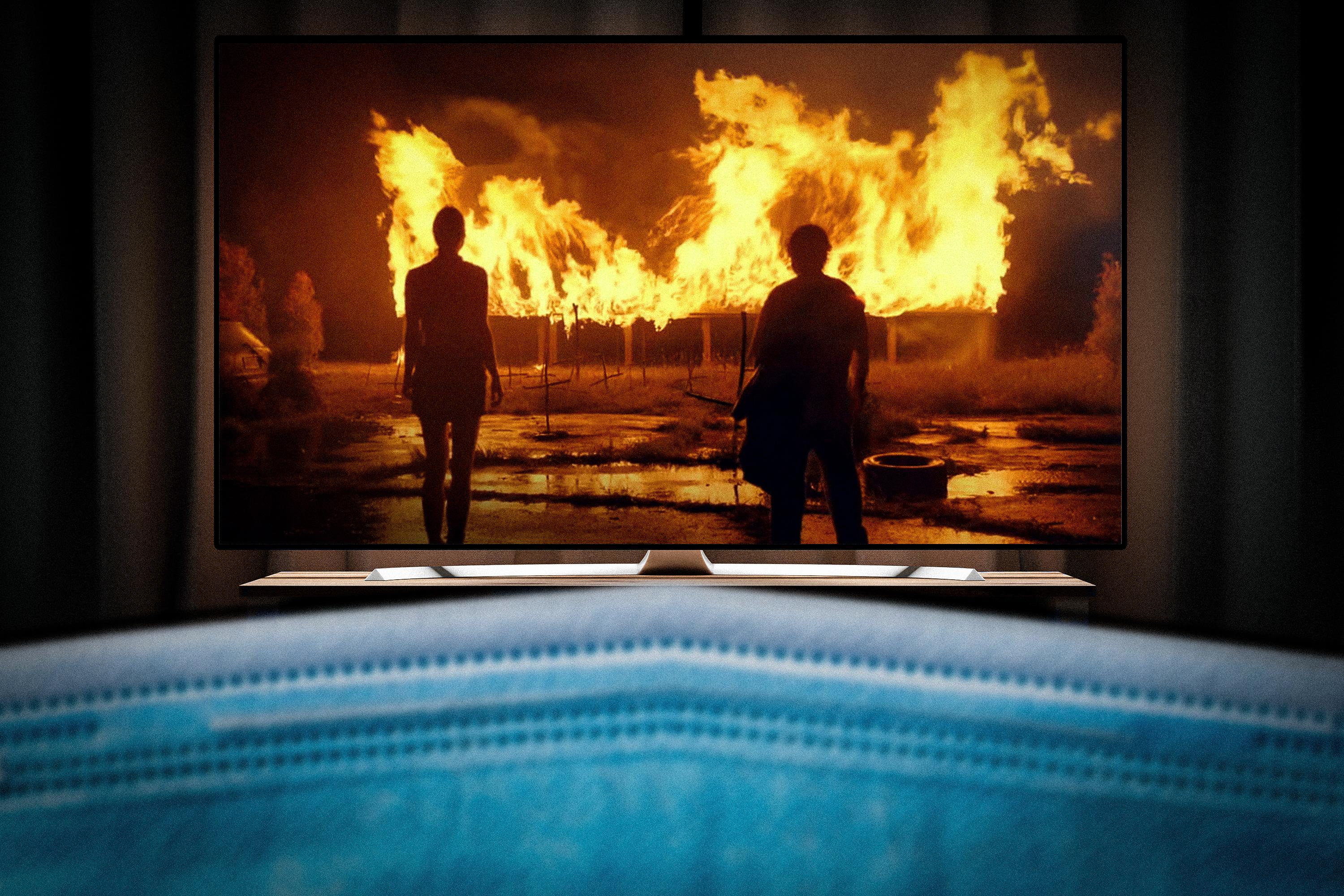
In many American minds, the coronavirus pandemic began on March 11, 2020, when Tom Hanks and Rita Wilson announced they’d caught COVID, the NBA halted its season, and Donald Trump (mistakenly) said he was suspending all travel from Europe. If we want to be technical about when our internal clocks collectively switched to the temporal morass of COVID time, March 11 was the day when the World Health Organization made the pandemic designation official. But we should have known we were in for a calamity no later than March 8, when Stephen King declared that COVID was not like The Stand.
King was trying to calm the masses, but it didn’t bode well that he felt driven to distinguish between reality and a novel in which a 99.4-percent-communicable, 100-percent-fatal influenza erases civilization and plunges the survivors of the former United States into an existential showdown between a democratic city-state and a demonic dictator that culminates in a nuclear explosion. When current events even slightly resemble a post-apocalyptic book by the master of horror, the world has strayed far from its recommended setting.
The day after King’s tweet, Station Eleven author Emily St. John Mandel was asked for a second opinion on our species’ prognosis. She too assured her followers that her book about the aftermath of a viral catastrophe was still squarely in the realm of fiction, a sentiment she expressed again later that month.
When King and Mandel downplayed COVID’s apocalyptic potential, TV adaptations of their novels were already in production. The Stand would air on CBS All Access from late December 2020 through mid-February 2021, while Station Eleven ended its run on HBO Max on Thursday. I binged both. I also watched Sweet Tooth, To the Lake, and The Rain, played The Last of Us Part II, and consumed a steady diet of The Walking Dead. (I read but didn’t watch the short-lived Y: The Last Man, though I did stream a series with a similar premise called Creamerie.) Even if I exclude all of the recent TV shows (and feature films) about other apocalyptic catastrophes—some men just want to watch the world burn, freeze, and get invaded by aliens—devastating outbreaks have made up a significant portion of my pandemic media diet. At this point, the pandemic will probably last long enough for The Last of Us to come around again, and I’ll definitely double dip.
One conclusion I could draw from this review of my pandemic media habits is that I’ve probably been watching way too much TV. (I mean, still with The Walking Dead?) Another, though, is that I was deriving some solace from watching shows about the world going to shit at a time when the world was going to shit. To some extent it still is, and so to some extent I still am. And I think the reason is similar to the impulse that prompted people to tweet at well-known novelists in March 2020: I want storytellers like King and Mandel to remind me that however bad things are, they could always be worse.
It’s not surprising that novelists and screenwriters were on the list of frequently consulted COVID commentators, along with doctors, epidemiologists, and conspiracy theorists—any oracle in a storm. On March 14, the writer of Steven Soderbergh’s Contagion, Scott Z. Burns, told Vulture that he was fielding frequent calls from “friends and people with kids asking if I have any insights into what I think is going on and what’s going to happen next.” Most of them were probably hoping he’d say something similar to the last line of the interview: “We have an amazing track record of getting through these things, and we will get through this one.”
Contagion, of course, experienced a surge in viewership as COVID began to break out, as did Outbreak and other pandemic-centric stories. “I don’t know who in their right mind would want to read Station Eleven during a pandemic,” Mandel tweeted, one of several times she expressed surprise, and even consternation, that COVID had boosted her book’s sales. Maybe the takeaway is that few people are in their right minds during a pandemic. Writers talked to psychologists about the popularity of pandemic fiction, and academics conducted studies. Explanations included the close link between anxiety and excitement; the desire to feel a form of control over, and understanding of, an unpredictable, unknowable, and invisible threat; the longing to connect, identify, and commiserate with characters who are facing the same fears.
Weirdly, I wasn’t drawn to contagion stories in which the danger was defused and contained, offering hope of a happy ending to our present predicament. I wanted the ones that were worst-case scenarios. Granted, the pandemic wasn’t the first impetus for me to seek out these stories; I’ve always been drawn to them, which is why I read Station Eleven not long after it came out. I grew up reading not just The Stand, but also Earth Abides, A Canticle for Leibowitz, The Postman, The Road, I Am Legend, The Last Man, and more end-of-days narratives in the same unnerving vein. In part, I probably return to these tales to keep posing the hopefully unanswerable question that Mandel once formulated: “Who would you be at the end of the world?” (I suspect I would be someone with an equanimous temperament but a near-total and almost certainly fatal lack of practical skills.)
During the pandemic, some readers, viewers, and players sensibly hesitated to subject themselves to such stories, and the messaging and marketing of projects that entered development or production prior to COVID reflected the environment in which they arrived. Naughty Dog, the developer of The Last of Us, rebranded the franchise’s “Outbreak Day”—essentially, the March 11 equivalent within the timeline of The Last of Us—as “The Last Of Us Day.” Creators and stars emphasized that they’d dialed down the darkness, that while their series included pandemics, they were not about pandemics, and that people who’d lived through some semblance of the real thing would still be “safe watching the show.” Many critics recommended pieces of pandemic media almost apologetically, acknowledging that they were tough sells and assuring audiences that they weren’t as excruciating as they sounded.
I understand, and share, the desire for escapism promised by sanitized, post-pandemic media. When I wasn’t mainlining dramas about monsters roaming the countryside after the downfall of civilization, I was checking out comedies about monsters roaming the countryside before the downfall of civilization, like Emily in Paris. Even when I was watching apocalyptic content, I wasn’t really looking for resemblance to real life. I wasn’t sorry that, say, The Stand mercifully skips much of the book’s description of how the virus circulated, or that most of Station Eleven takes place 20 years after most people perish, when inexorable illness is no longer the survivors’ most pressing concern. Some of the most disturbing scenes of the actual pandemic were the ones that mirrored the opening minutes of every viral disaster story: empty streets in city centers, unstocked store shelves, overcrowded hospitals, hazmat suits, makeshift morgues, and more. Those were the sights that made me feel most unsettled, because they suggested that we had been transported to the darkest timeline. I wanted to be told that there were way darker ones out there, and that the story we can’t escape would diverge from the ones I was watching.
Most post-apocalyptic tales, to varying degrees, are about bonding, rebuilding, and persevering under trying circumstances. Station Eleven is more about the beauty of blowing on embers to keep a few flames burning bright than it is about dwelling on the ones that were extinguished. From my privileged perspective, though, apocalypse stories are less a source of inspiration or a dubious survival guide than they are a reassuring form of exposure therapy (without the actual, um, exposure). The problem with immersing oneself in media that pretends the pandemic is over or acts as if it never occurred is that reality lies in wait after the credits roll. Indulging in the fantasy of a world without the coronavirus makes it only more discouraging when the doomscrolling and case counting resumes. Apocalyptic fiction, by contrast, makes that transition slightly more palatable. Watching or playing an apocalyptic TV show, movie, or video game to gird oneself for the next day’s news works a little like a slugger swinging a weighted bat in the on-deck circle to make their unweighted bat feel lighter at the plate. It probably doesn’t make them swing any faster, but it may improve their frame of mind. And these days especially, improving one’s mental state is something worth striving for.
In a sense, apocalyptic fiction does offer escapism—the ability to return to real life and, however briefly, feel as if one is escaping something worse. We can take small measures of comfort in clearing the extremely low bars set by the most pessimistic and virulent variants of our imaginations. At least COVID doesn’t have an impossibly lethal 99.9 percent fatality rate, like Station Eleven’s Georgia Flu. (The theme of Station Eleven is that “survival is insufficient,” but when almost everyone else is expiring, survival is a pretty strong start.) At least our dead don’t come back to life as implacable cannibals, as in The Walking Dead; at least those afflicted with omicron or delta don’t mutate into horrors that stalk and click and combine with other victims into many-limbed monstrosities, like the Infected in The Last of Us. At least people aren’t having hybrid, half-human babies that relentless militias are hunting and killing, and at least the virus isn’t carried by rainfall. At least our power and water work and our supply chain is only delayed, not destroyed.
Most important, at least we have life-saving vaccines to take and pills to pop. No method of prevention or treatment is universally available or offers perfect protection, but taken together, the tools at our disposal deliver a dramatic reduction in risk and the potential to lead a safer, more leisurely life than those of fictional, post-apocalyptic characters who can’t dream of vaccines, cures, or even indoor plumbing. (Nature never seems to call on Station Eleven, so the Traveling Symphony does seem to have iron bladders and bowels on its side.) Station Eleven and other art of its ilk make it possible to appreciate what we’ve avoided. They’re reminders of what we’ve lost, but also of what we still have—or, in Station Eleven’s lingo, opportunities to look over the damage and try to remember the sweetness of life.
At a point of peaking case counts, hospital staffing shortages, and continued deaths, engaging with pandemic media feels hardly less fraught than it did during the first, second, or fourth waves of COVID, vaccines and boosters notwithstanding. For those who’ve lost their lives, their livelihoods, or their loved ones as a result of the pandemic, COVID has been about as devastating as a real-life Captain Trips; just because it hasn’t ended or ruined every life doesn’t mean it hasn’t left its mark on far too many. Possessing the time and mindset for fictional depictions of apocalypse is probably a luxury enjoyed largely by those who’ve gotten off relatively easy over the past two years.
That’s almost long enough to feel like there is no before. But there will always be a market for stories that indirectly or consciously suggest what Station Eleven showrunner Patrick Somerville said this week: “I do think that we will be OK.” And even if we can’t count on OK, maybe we can work with “better than the end times.” To quote the play that opens Station Eleven, and that may itself have been the product of a plague: “And worse I may be yet. The worst is not, so long as we can say, ‘This is the worst.’” To The Last of Us, Station Eleven, and the many other tales of widespread woe that have helped distract and sustain me since March 2020, I say: Thanks for being the worst.

